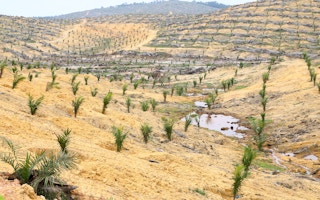IOI Group has been dealt a new blow as a group of non-government organisations (NGOs) on Thursday called for a mass boycott of the company, following its move to sue the Roundtable on Sustainable Palm Oil (RSPO) earlier this week.
To continue reading, subscribe to Eco‑Business.
There's something for everyone. We offer a range of subscription plans.
- Access our stories and receive our Insights Weekly newsletter with the free EB Member plan.
- Unlock unlimited access to our content and archive with EB Circle.
- Publish your content with EB Premium.
A coalition of 22 environmental organisations issued an open letter to hundreds of global brands and palm oil traders, urging them to cancel all sourcing contracts and business relationships with the IOI Group and its processing arm, IOI Loders Croklaan.
The Malaysian palm oil giant is suing RSPO - the industry association for sustainable palm oil - over RSPO’s decision to suspend IOI Group’s membership from the organisation, and for banning it from selling palm oil that is “certified sustainable”.
The suspension was the result of the company’s failure to adequately address several complaints that IOI subsidiaries in Indonesia were flouting RSPO rules on clearing forests and draining peatlands, and also for violating national laws by operating without proper licenses.
Green groups have also reported labour and human rights abuses on IOI Group-owned plantations.
While IOI is currently taking steps to address these flaws, it says it filed the lawsuit because the extent of punitive action taken by RSPO is too extreme and resulted in “commercial and reputational losses”.
Gemma Tillack, agribusiness campaign director for RAN, said the lawsuit is a “drastic decision” by company executives, and shows that IOI Group “is digging in its heels rather than truly trying to solve its serious conflict palm oil problem”.
In the letter, green groups added that “it is clear that only economic consequences will compel the IOI Group to take responsibility for cleaning up its act”.
“
Whatever IOI was hoping to achieve through this lawsuit has backfired, with even more of its customers now deserting the company.
Ivy Schlegel, Greenpeace United States spokesperson
Major global consumer firms such as Unilever, Mars, Nestle, and Ferrero have already dropped IOI as a supplier, and those that fail to do the same “are taking a major risk by associating their brand reputation with a supplier known to be connected to conflicts with communities, exploitation of workers and the ongoing clearing and burning of natural forests,” added Tillack.
The letter by the NGO coalition - made up of organisations including Transformasi untuk Keadilan Indonesia (TuK INDONESIA), US-based Rainforest Action Network (RAN), Greenpeace, and the Union of Concerned Scientists - also laid out conditions that IOI must meet to put an end to the calls for a boycott.
These included dropping the legal case against RSPO, immediately halting all plantation development and expansion until a proper land assessment has identified forest conservation areas, and investing resources into rehabilitating all the peatlands and forest the company has burnt and degraded.
The NGOs also pointed to a 2014 report by Finnish civil society organisation Finnwatch outlining labour exploitation and conflict with indigenous communities, and said that IOI must tackle these abuses immediately.
Ivy Schlegel, Greenpeace United States spokesperson, said that “whatever IOI was hoping to achieve through this lawsuit has backfired, with even more of its customers now deserting the company”.
“Instead of trying to bully its critics, IOI should stop creating the conditions for forest fires by trashing Indonesia’s peatlands”.








